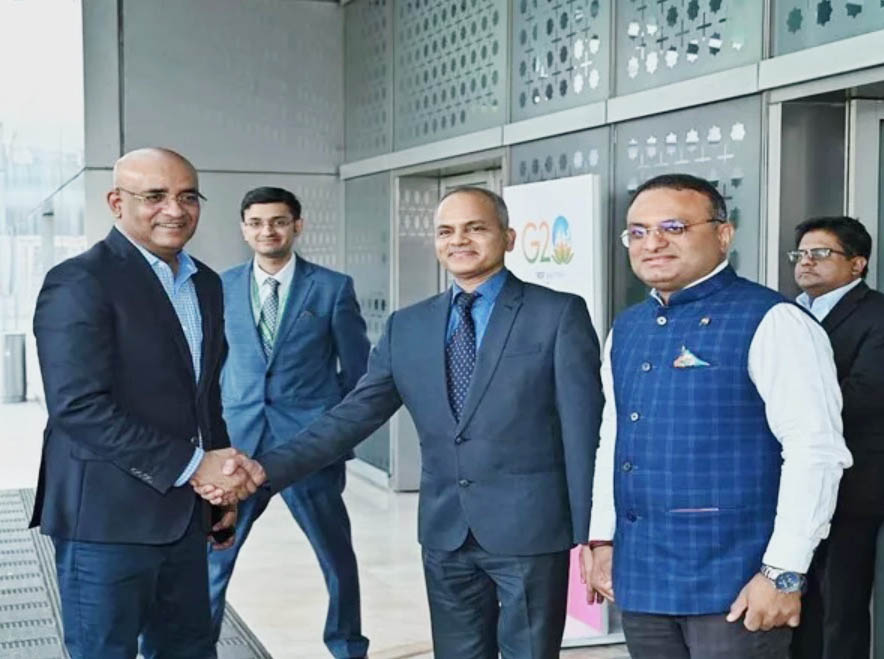Visits to India over a brief period, first, President, Irfaan Ali and afterwards by his Vice President, Bharrat Jagdeo, have provided unmistakable signs of the intention of the now oil-rich South American republic to significantly strengthen existing ties with India, through the vehicle of the local oil and gas industry. While India and Guyana may have established formal diplomatic ties a mere fifty-seven years ago, links between the two countries date back to the colonial era when East Indians arrived in the former British colony to provide indentured labour for the local sugar plantations. The contribution of the earliest waves of Indian arrivals to shaping what is now a fast-emerging twenty-first century modern state is clear to see in various aspects of social, economic and political life. Going forward, the portents for the future of relations between India and Guyana appear to repose, largely, in the coincidence between India’s circumstance as the world’s third largest oil consumer and Guyana’s position as one of the ‘rising stars’ among global oil producers.
Analysts, one feels, might seek to read a fair measure of symbolism into the fact that back in 2021 India acquired the first shipment of oil ever to be exported by Guyana, – a one million barrel consignment of so-called ‘Liza Light Sweet Crude’ – a development that marked India’s determination to diversify the sourcing of its energy supplies (its own considerable domestic oil reserves notwithstanding) in the light of an increasingly contentious global oil market. Since then, the status quo has shifted away from what had been, initially, a stated lack of appetite for entering into a longer term oil sales deal with India to what now appears to be an imminent major deal. Back in January we learnt that bilateral discourses between Georgetown and Delhi, regarding the latter’s considerable interest in a solid, long-term oil purchase deal with Guyana, had metamorphosed into an understanding that Guyana would entertain a proposal from India to that effect. India, at the same time, according to President Ali, was also seeking participation in the ‘entire ecosystem of oil and gas’ in Guyana that would extend into Indian training for Guyanese professionals in the oil and gas sector as well as scouting out more private sector involvement in the country’s wider oil and gas sector.
Earlier this week, and following a January visit to India by Vice President Bharrat Jagdeo, regarded as the Czar of the country’s energy sector, a disclosure was made regarding the likely signing of a Memorandum of Understanding (MOU) between Guyana and India designed to boost cooperation in the oil and gas sector. A February 27 Caribbean News Weekly report on the planned signing of the agreement alluded to “an interview with an Indian news outlet” during which Vice President Jagdeo “laid out several plans for Guyana” which provided a broader perspective on business and economic ties with India, going forward,” during which he reported, “we also explored the possibility of India examining the abundant resources that we’ve had outside of those that are on auction now.” Here, Jagdeo was reportedly alluding to “… the abundant resources we’ve had outside of those that are on auction now,” including other opportunities that lie in the Stabroek Block “next year,” when “Exxon Mobil will have to give up 20 per cent of their holdings, a circumstance which he is quoted as saying will make those surrendered holdings “available for some form of bilateral agreement where we can actually see joint production or exploration-related activities.”
On top of these possible oil and gas-related agreements with India, Vice President Jagdeo reportedly said that Guyana is also seeking an arrangement that would allow for the recruitment of skilled Indian workers to help develop the oil and gas sector here. Going beyond those envisaged arrangements which, if realized, will mark the most significant bilateral agreement between the two countries, Vice President Jagdeo is also quoted as saying that, setting aside the role that such an agreement will play in “defining our gas policy”, Guyana would also be seeking, “from a development perspective,” an agreement that supports the substantive growth of Guyana’s overall oil and gas sector.






